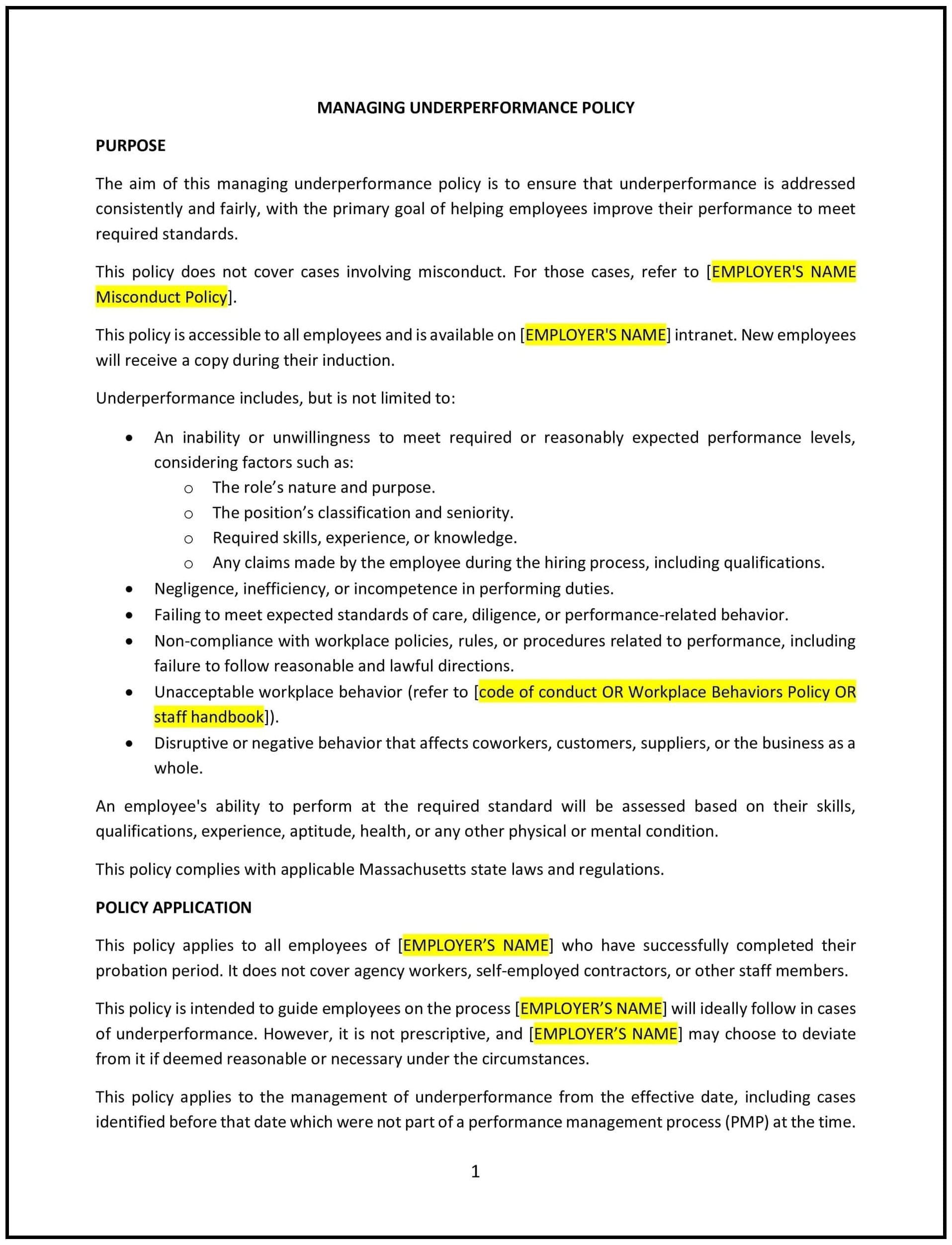Managing underperformance policy (Massachusetts): Free template
Got contracts to review? While you're here for policies, let Cobrief make contract review effortless—start your free review now.

Customize this template for free
This managing underperformance policy is designed to help Massachusetts businesses address and manage employee performance issues in a fair, transparent, and legally compliant manner. The policy provides clear guidelines on how underperformance is identified, addressed, and corrected, ensuring that employees are given the necessary support to improve their performance while maintaining a productive and efficient workplace. It also outlines the steps the company will take if performance issues are not resolved, including potential disciplinary actions.
By adopting this policy, businesses can foster a culture of accountability and support while ensuring that employees understand the expectations for performance and how to meet them.
How to use this managing underperformance policy (Massachusetts)
- Define underperformance: Clearly define what constitutes underperformance, including failure to meet established performance standards, not achieving set goals, or consistently producing poor quality work. The policy should specify how underperformance will be assessed based on job responsibilities and company expectations.
- Outline the steps for addressing underperformance: Specify the process for addressing underperformance, which should include initial feedback, setting performance improvement goals, providing additional training or resources if necessary, and offering support to help employees meet expectations. The policy should explain the timeline for performance reviews and the feedback process.
- Provide support and coaching: The policy should emphasize that managers will provide coaching and support to help employees improve their performance. This may include regular check-ins, skills development opportunities, mentoring, or adjustments to workloads or job responsibilities.
- Set clear expectations: The policy should establish clear performance expectations and communicate them to employees, including any specific goals or targets they are expected to meet. It should also outline how progress will be tracked and measured.
- Implement a formal performance improvement plan (PIP): If underperformance persists after initial feedback and support, the policy should outline the steps for implementing a formal performance improvement plan (PIP). The PIP should include specific goals, timelines for improvement, and regular follow-up meetings.
- Address disciplinary actions: The policy should specify the steps that will be taken if performance issues are not addressed through coaching and a PIP. This may include disciplinary actions such as written warnings, suspension, or termination of employment, depending on the severity of the underperformance.
- Ensure compliance with Massachusetts and federal laws: Ensure that the policy complies with Massachusetts state laws, including those related to wrongful termination, and federal regulations, such as the Fair Labor Standards Act (FLSA), which governs overtime and exempt employee classifications.
- Review and update regularly: Periodically review and update the policy to ensure it remains aligned with company objectives, legal requirements, and best practices for managing performance.
Benefits of using this managing underperformance policy (Massachusetts)
This policy offers several benefits for Massachusetts businesses:
- Promotes fairness and consistency: By providing a clear process for managing underperformance, businesses ensure that all employees are treated fairly and consistently, reducing the risk of discrimination or bias.
- Improves employee performance: Offering employees the opportunity to improve their performance through coaching, support, and feedback can help them reach their full potential and contribute more effectively to the company’s goals.
- Reduces turnover: Addressing performance issues early and providing employees with the tools to succeed can reduce turnover by helping employees improve and remain in their roles.
- Protects the business: The policy helps ensure that performance issues are managed in compliance with Massachusetts state laws and federal regulations, reducing the risk of legal claims related to termination or disciplinary actions.
- Creates a culture of accountability: The policy encourages employees to take responsibility for their performance and fosters a workplace culture where employees are motivated to meet expectations and contribute to the company’s success.
- Enhances overall productivity: By addressing underperformance promptly and effectively, businesses can maintain high standards of productivity and efficiency, ensuring that all employees are meeting expectations and contributing to the organization’s objectives.
Tips for using this managing underperformance policy (Massachusetts)
- Communicate the policy clearly: Ensure that all employees are aware of the managing underperformance policy and understand the expectations for performance in their roles. This can be done through employee handbooks, orientation programs, and regular performance reviews.
- Offer support and resources: Provide employees with the necessary resources, training, and support to help them succeed. This could include coaching, mentoring, or additional skills development.
- Address issues early: Do not wait for underperformance to persist for long periods before taking action. Address issues as soon as they are identified and provide the employee with timely feedback.
- Set clear performance goals: Ensure that performance expectations are clear and measurable. Work with employees to set specific goals and timelines for improvement.
- Implement a performance improvement plan (PIP) when necessary: If underperformance persists, implement a formal PIP that clearly outlines the steps the employee must take to improve, along with the consequences of failing to meet the set expectations.
- Review and update regularly: Periodically review the policy to ensure it remains aligned with legal requirements, company objectives, and industry best practices for managing employee performance.